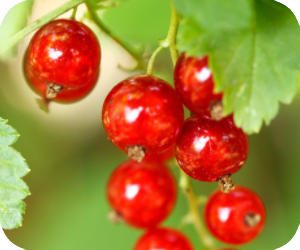Redcurrant Benefits

Redcurrant is a Ribes fruit offering many health benefits. The nutritional value of redcurrant is tremendous as this tasty fruit is known for its many benefits and positive effects. The main redcurrant benefits are: helps blood-clotting, strengthens immune system, healthy digestive system.
Learn important nutrition facts about redcurrant and the health benefits that this delicious fruit provides. Find out which body functions are supported by the nutrients found in redcurrant and how this variety of fruit can benefit your health. Discover important redcurrant data including how much protein and fat is in redcurrant, which vitamins and nutrients this type of fruit contains, and how many carbohydrates and calories are in fresh, pureed and cooked redcurrant.
Redcurrant Vitamins: B1, B2, B3, B5, B6, B9 (Folate), C, E and K *** Redcurrant Nutrients: calcium, iron, magnesium, manganese, phosphorus, potassium, zinc and dietary fibre *** Redcurrant Carbohydrates per 100g: 13.8 *** Redcurrant Calories per 100g: 56 *** Main Redcurrant Benefits: helps blood-clotting, strengthens immune system, healthy digestive system *** Redcurrant Size: small *** Redcurrant Skin: firm, plump, red glossy *** Redcurrant Taste: tangy *** Serving Suggestions: raw, pureed or cooked.
Did you know that redcurrant fruits belong to the genus Ribes in the gooseberry family and grows from a deciduous bush that typically produces between 7 to 9 pounds of redcurrants . Did you know that redcurrant benefits from being a naturally good source of Vitamin K which is essential for blood-clotting. Did you know that redcurrant is brimming with health benefits as this fruit contains a rich range of vitamins and minerals, redcurrant is particularly rich in Vitamin C. Did you know that the dietary fibre found in redcurrant benefits the digestive system and keeps bowels healthy?
-
Redcurrant Benefits Fact 1:
The nutrients that occur naturally in redcurrant provide many health benefits. The vitamins found in redcurrant include Vitamin B1, B2, B3, B5, B6, B9 (Folate), C, E and K. Other important redcurrant nutrients include calcium, iron, magnesium, manganese, phosphorus, potassium, zinc and dietary fibre. -
Redcurrant Benefits Fact 2:
Redcurrant contains a good range of nutrients that provide many health benefits. Amongst the nutrients produced by this fruit are Vitamins B1, B2, B3, B5, B6, B9 (Folate), C, E and K. -
Redcurrant Benefits Fact 3:
Redcurrant is an exceptional fruit with many health benefits. Redcurrants are a rich source of calcium, iron, magnesium, manganese, phosphorus, potassium, zinc and dietary fibre.
-
Redcurrant Benefits Fact 4:
The word calorie can be defined as a measurement of energy. Calories are also referred to as kilocalories or Kcal. The recommended daily calorie intake is approximately 2550 calories for adult males and 1940 calories for adult females. One of the health benefits of redcurrant is that this Ribes fruit releases energy slowly throughout the day. The amount of calories in 100 grams of redcurrant is 56. This great fruit makes a delicious snack for kids and adults that benefits by forming part of a healthy, nutritious diet. -
Redcurrant Benefits Fact 5:
Redcurrants can be described as small Ribes fruits with firm, plump, red glossy skin. The taste of this type of fruit can be described as tangy. Redcurrant can be served in various ways including raw, pureed or cooked. -
Redcurrant Benefits Fact 6:
One of the most amazing facts and benefits of Redcurrant is this healthy fruit's very high content of Vitamin C which is essential for many body functions including the immune system, skin, eyes and joints. Vitamin C helps to keep our bodies strong allowing us to form a natural defence against common colds and flu viruses. -
Redcurrant Benefits Fact 7:
Redcurrants should be stored in a cool place or in the refrigerator for several days. Redcurrant contains a good range of nutrients that provide many health benefits. Amongst the nutrients produced by this fruit are vitamin B1, B2, B3, B5, B6, B9 (Folate), C, E and K and calcium, iron, magnesium, manganese, phosphorus, potassium, zinc and dietary fibre. Try to pick fresh redcurrants with healthy skin to ensure the fruit retains as many nutrients and health benefits as possible. -
Redcurrant Benefits Fact 8:
The origin of this tasty Ribes fruit is thought to have began hundreds of years ago when they grew in the wild in regions across western Europe. -
Redcurrant Benefits Fact 9:
This type of fruit can be used in a variety of delicious redcurrant recipes including jellies, soups, jams, preserves, summer puddings and desserts. Redcurrant can be eaten raw, pureed or cooked. There are many ways to enjoy the health benefits of this delightful fruit. -
Redcurrant Benefits Fact 10:
Main Redcurrant Benefits: helps blood-clotting, strengthens immune system, healthy digestive system *** Redcurrant Vitamins: B1, B2, B3, B5, B6, B9 (Folate), C, E and K *** Redcurrant Nutrients: calcium, iron, magnesium, manganese, phosphorus, potassium, zinc and dietary fibre *** Redcurrant Carbohydrates per 100g: 13.8 *** Redcurrant Calories per 100g: 56 *** Fruit Size: small *** Fruit Skin: firm, plump, red glossy *** Fruit Taste: tangy *** Fruit Serving Suggestions: raw, pureed or cooked.
Vitamins | B1, B2, B3, B5, B6, B9 (Folate), C, E and K |
Nutrients | calcium, iron, magnesium, manganese, phosphorus, potassium, zinc and dietary fibre |
Carbs 100g | 13.8 |
Calories | 16 (1 oz) |
Calories 100g | 56 |
Benefits | helps blood-clotting, strengthens immune system, healthy digestive system |
Health Benefits of Fruit
Fresh red currants: 56 calories / 13.8g carbs
1oz red currants: 16 calories
Benefits healthy blood, immune and a digestive system
Enjoy in jellies, soups, jams, preserves, summer puddings and desserts